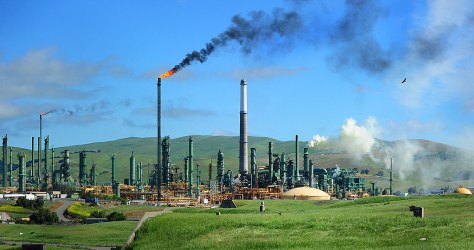
Benicia Fire Department on Facebook, March 6, 2023, around noon. (Also posted on City of Benicia Nextdoor.)

Benicia Fire Department on Facebook, March 6, 2023, around noon. (Also posted on City of Benicia Nextdoor.)
Repost from KQED News

A flaring incident at the Tesoro oil refinery in Martinez prompted Contra Costa County health officials to issue a health alert in several communities early Tuesday afternoon.
The Level 2 alert was issued for people in Martinez, Pacheco, North Concord and Clyde who have “respiratory sensitivities.”
The alert was canceled at about 1:30 p.m., after smoke produced by the flaring dissipated.
Maria Duazo, with the county Department of Health Services’ hazardous materials program, said the flaring occurred after a boiler in a unit of the refinery malfunctioned at around 12:15 p.m.
“As a result there was some black smoke that came off,” Duazo said. “It appears that some odors came off, so we have some air monitors downwind from the refinery.”
The Department of Health Services says the smoke, which was rapidly dispersed by brisk northerly winds, should not pose a hazard to most people in the area.
Just after 2 p.m., Tesoro issued a statement on the incident:
At approximately 11:47 PST this morning, Tesoro Martinez experienced a loss of our primary steam generation unit that caused upsets in several process units. These upsets resulted in flaring with visible smoke. A Community Warning System Level 2 was activated per procedure, due to the smoke drifting offsite.
There were no injuries as a result of this event. We do not expect any adverse health effects. We are working closely with Contra Costa County health personnel and other regulatory agencies.
At this time, the steam generation unit is back on-line, and the refinery is currently in stable condition at reduced rates. The refinery is no longer flaring.
Our main priority is to safely return the refinery to normal operations and to minimize the impact to the community and the environment.
As of 1400, the event has been downgraded to a CWS Level 0. Additional information will be provided as it becomes available.
The hazardous materials program is expected to require Tesoro to provide a report on the incident within the next 72 hours.
Repost from SFGate
Chevron has agreed to pay $146,000 in fines for spewing pollutants into the air at its refinery in Richmond, air quality regulators said Tuesday.
The penalty stems from 22 citations from the Bay Area Air Quality Management District mostly for discharging unhealthy levels of hydrogen sulfide and other harmful compounds through flaring, the process of burning off excess gas, common at industrial sites.
The refinery was also cited for excess carbon monoxide coming out of its furnace.
“Even though the incidents were minor and did not result in any significant impacts to people or the environment, we take these matters seriously, and have taken preventative measures to avoid similar situations from occurring in the future,” said Leah Casey, a spokeswoman for Chevron Corp., in an e-mail to The Chronicle.
The notices of violation were sent to Chevron between 2012 and 2014. The fines will support the air district’s enforcement work.
Repost from The Jamestown Sun, Jamestown, ND
A group of North Dakota legislators have introduced legislation aimed at gutting two of the state’s most significant regulatory decisions involving oil and gas. A bill could nullify requirements to ratchet down the massive wasteful flaring of natural gas and to impose standards to make crude oil less volatile before shipment by rail. It also would risk forfeiting $112 million in revenues during a two-year budget period. The question is why?
House Bill 1187, whose primary sponsor is Rep. Keith Kempenich, R-Bowman, is a naked attempt by a handful of legislators to override the executive function of the North Dakota Industrial Commission, comprised of the governor, attorney general and agriculture commissioner, all elected by voters statewide. Members of the Industrial Commission — after lengthy consideration and input from industry and the public — imposed regulations that will force industry to curb the massive, wasteful flaring of natural gas and to make crude oil less explosive.
Kempenich, in trying to justify his sweeping bid to weaken executive authority, complains that the Legislature was “left out of the loop” in decisions that are squarely before the North Dakota Industrial Commission as ultimate overseers of oil and gas. He glibly dismissed the flaring reduction goals — standards based on lengthy testimony with considerable input from industry — as “arbitrary,” and wants to make them go through a rule-making process that would involve lawmakers.
Where is the public clamor to roll back gas flaring? Halting progress on reducing flaring would cost an estimated $18.8 million per biennium in lost revenues. The state’s top staff regulator has said reaching the next tier of flaring reduction goals will be a “real stretch,” but officials say the Industrial Commission has leeway to grant flexibility in implementing its order, if deemed reasonable.
Where is the public outcry for softening standards to reduce the volatility of explosive Bakken crude oil? Not in Casselton, which last year dodged a massive explosion after an oil train derailment near the town. The order to “condition” oil before shipment carries an estimated cost of just 10 cents per barrel. But failure by the state to make oil safer for shipment could trigger more costly federal regulations that also could deprive the state of $93 million in revenues over a two-year budget cycle.
There is, of course, no public outcry to reverse either of these orders and send them through a legislative sideshow. Instead, Kempenich and his legislative accomplices have their ears attuned to the oil industry, which wants to exploit the drop in oil prices as an excuse to roll back sound regulations. The stewardship of North Dakota’s natural resources — and especially the safety of its citizens — shouldn’t be put in jeopardy. Lawmakers should kill Kempenich’s boondoggle.
You must be logged in to post a comment.